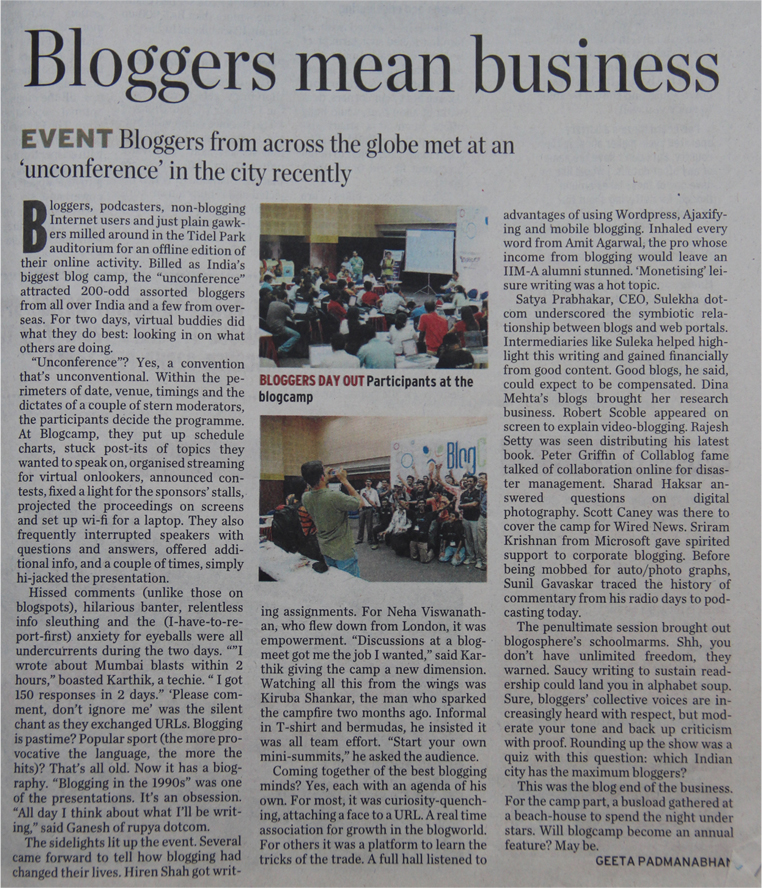Blogger mean business
Bloggers, podcasters, non-blogging Internet users and just plain gawkers milled around in the Tidel Park auditorium for an offline edition of their online activity. Billed as India’s biggest blog camp, the “Unconference” attracted 200-old assorted bloggers from all over India and a few from overseas. For two days, virtual buddies did what they do best: looking in on what others are doing.
“Unconference”? Yes, a convention that’s unconventional. Within the perimeters of date, venue, timings and the dictates of a couple of stern moderators, the participants decide the programme. At Blogcamp, they put up schedule charts, stuck post-its of topics they wanted to speak on, organized streaming for virtual onlookers, announced contests, fixed a light for the sponsors’ stalls, projected the proceedings on screen and set up Wi-Fi for a laptop. They also frequently interrupted speakers with questions and answers, offered additional info, and a couple of times, simply hi-jacked the presentation.
Hissed comments (unlike those on BlogSpot’s), hilarious banter, relentless info sleuthing and the (I-have-to-report-first) anxiety for eyeballs were all undercurrents during the two days. “I wrote about Mumbai blasts within 2 hours,” boasted Karthick, a techie. “I got 150 responses in 2 days,” ‘Please comment, don’t ignore me’ was the silent chant as they exchanged URLs. Blogging is pastime? Popular sport (the more provocative the language, the more the hits)? That’s all old. Now it has a biography. “Blogging in the 1990s” was one of the presentations. It’s an obsession. “All day I think about what I’ll be writing,” said Ganesh of rupya dotcom.
The sidelights lit up the event. Several came forward to tell how blogging had changed their lives. Hiren Shah got writing assignments. For Neha Viswanathan, who flew down from London, it was empowerment. “Discussions at a blog-meet got me the job I wanted,“ said Karthick giving the camp a new dimension. Watching all this from the wings was Kiruba Shankar, the man who sparked the campfire two months ago. Informal in T-Shirts and Bermudas, he insisted it was all team effort. “Start your own mini-summits,” he asked the audience.
Coming together of the best blogging minds? Yes, each with an agenda of his own. For most, it was curiosity-quenching, attaching a face to a URL. A real time association for growth in the blogworld. For others it was a platform to learn the tricks of the trade. A full hall listened to advantages of using WordPress, Ajaxifying and mobile blogging. Inhead every word from Amit Agarwal, the pro whose income from blogging would leave an IIM-A alumni stunned. ‘Monetising’ leisure writing was a hot topic.
Satya Prabhakar, CEO, Sulekha dotcom underscored the symbiotic relationship between blogs and web portals. Intermediaries like Sulekha helped highlight this writing and gained financially from good content. Good blogs brought her research business. Robert Scoble appeared on screen to explain video-blogging. Rajesh Shetty was seen distributing his latest book. Peter Griffin of Collablog fame talked of collaboration online for disaster management. Shared Haksar answered questions on digital photography. Scott Caney was there to cover the camp for Wired News. Sriram Krishnan from Microsoft gave spirited support to corporate blogging. Before being mobbed for auto/photo graphs, Sunil Gavaskar traced the history of commentary from his radio days to podcasting today.
The penultimate session brought out blogosphere’s schoolmarms. Shh, you don’t have unlimited freedom, they warned. Saucy writing to sustain readership could land you in alphabet soup. Sure, blogger’s collective voices are increasingly heard with respect, but moderate your tone and back up criticism with proof. Rounding up the show was a quiz with this question: which Indian city has the maximum bloggers?
This was the blog end of the business. For the camp part, a busload gathered at a beach-house to spend the night under stars. Will Blogcamp become an annual feature? May be.
